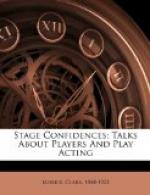You can train your brain by studying Shakespeare and the old comedies. Study not merely the leading part, but all the female parts; it is not only good training, but you never know when an opportunity may come to you. The element of “chance” enters very largely into the theatrical life. Above all, try to remember the lines of every female character in the play you are acting in; it might mean a sudden rise in your position if you could go on, at a moment’s notice, and play the part of some one suddenly taken ill.
Then work, work, and above all observe. Never fail to watch the acting of those about you. Get at the cause of the effects. Avoid the faults, and profit by the good points of the actors before you, but never permit yourself to imitate them.
One suggestion I would make is to keep your eyes open for signs of character in the real life about you. The most successful bit of business I had in “Camille” I copied from a woman I saw in a Broadway car. If a face impresses you, study it, try afterward to recall its expression. Note how different people express their anger: some are redly, noisily angry; some are white and cold in their rage. All these things will make precious material for you to draw upon some day, when you have a character to create; and you will not need to say, “Let me see, Miss So-and-So would stand like this, and speak very fast, or very slow,” etc.
You will do independent work, good work, and will never be quite satisfied with it, but will eagerly try again, for great artists are so constituted; and the hard life of disappointments, self-sacrifices, and many partings, where strong, sweet friendships are formed only to be broken by travelling orders, will all be forgotten when, the glamour of the footlights upon you, saturated with light, thrilling to music, intoxicated with applause, you find the audience is an instrument for you to play upon at will. And such a moment of conscious, almost divine power is the reward that comes to those who sacrifice many things that they may act.
So if you really are one of these, I can only say, “Act, act!” and Heaven have you in its holy keeping.
But, dear gifted woman, pause before you put your hand to the plough that will turn your future into such strange furrows; remember, the life of the theatre is a hard life, a homeless life; that it is a wandering up and down the earth; a life filled full with partings, with sweet, lost friendships; that its triumphs are brilliant but brief. If you do truly love acting, simply and solely for the sake of acting, then all will be well with you, and you will be content; but verily you will be a marvel.
For the poor girl or woman who, because she has to earn her own living, longs to become an actress, my heart aches.




